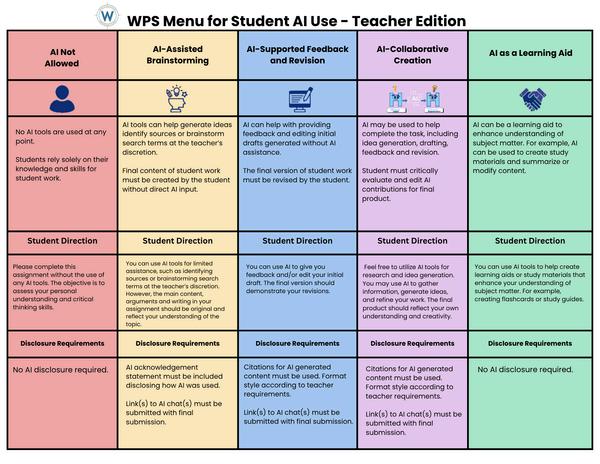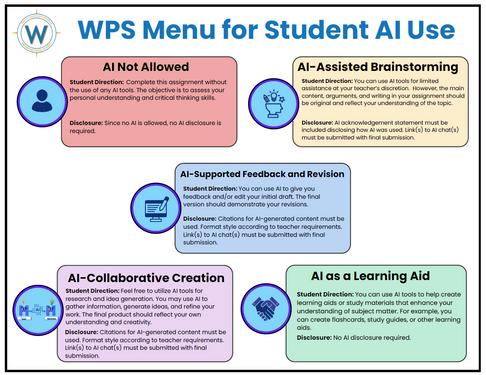

AILITERACY
AHuman-CenteredApproach

Tableof Contents
Part1:Human-CenteredAILiteracyandGuidance UnderstandingAI
Waterford’sHuman-CenteredApproachtoAIinEducation LeveragingAItoEnhanceInstruction
Part2:PracticalGuideforAIintheClassroom
IntroducingAIAcrossK-12:Age-AppropriateGuidance (Elementary)
IntroducingAIAcrossK-12:Age-AppropriateGuidance (MiddleandHighSchool)
Teachers’ConsiderationRegardingAIUseinAssignments WPSMenuforStudentAIUse(TeacherandStudentEditions) ClassroomMatrixofAssignments ImplementingAIinStudentLearninginWPS AcademicIntegrityWhenUsingAI
Part3:EthicalConsiderationsandResponsibleUse TheEthicsofAIvs.TheEthicalUseofAI CurrentRegulationRelevanttoAIUseinEducationRegarding SensitiveandConfidentialInformation

TheWaterfordSchoolDistrictiscommittedtoahumancenteredapproachtoartificialintelligence(AI)ineducation, ensuringthatAIservesasatoolforenhancingteachingand learningwhileupholdingethicalandresponsibleuse.This documentprovidesafoundationforAIliteracyandguidelines, equippingeducatorsandadministratorswithastructured framework:HumanInquiry → AI → HumanEmpowerment(H → AI → H).Thisapproachemphasizesthethoughtfulintegrationof AItosupporthumandecision-makingandstudentlearning. Withinthisdocument,youwillfindguidingprinciples,core valuesandkeydefinitionsthatshapeAIuseinourschools. Additionally,itofferspracticalconsiderationsforeducatorsand administratorsastheydevelopAI-enhancedlearning environmentsandguidelinesthatprioritizeequity,transparency, andstudentwell-being.
UnderstandingArtificialIntelligence
WhatisAI?
ArtificialIntelligence(AI):AIisatechnologythathelpsmachines actinsmartways,likemakingdecisions,recognizingpatterns,or completingtasks.Itworksbyusingdata,rules,andlearning methodstofigurethingsout.Forexample,AIpowersfacial recognitiononphones,virtualassistantslikeAlexaandSiri,andthe algorithmsbehindsocialmediafeeds.
GenerativeAI(GenAI):GenAIisatypeofAIthatcreatesnew contentliketext,images,andmusicbylearningfromexamples.It’s anewerkindofAIthatcanhelpmakecreativeandpersonalized materials,likeeducationaltoolsorartisticdesigns.
Waterford’sHuman-CenteredApproachto ArtificialIntelligenceinEducation
IntheWaterfordSchoolDistrict,fosteringAIliteracyandresponsibleAIuse requiresathoughtfulapproachthatensuresAIservesasatoolforlearning, problem-solving,andempowerment.Ahuman-centeredAIlearning environmentprioritizestheneeds,abilities,andexperiencesofstudents, educators,andadministrators AIusageinourdistrictshouldalways incorporatehumanintelligence,oversight,andresponsibility.AllAIusemust beginandendwithhumaninsight.
Thedistrictcansupportthisvisionbyfocusingonthefollowingkeyareas:
DevelopingAILiteracy–Equipstaffandstudentswithafoundational understandingofAIconcepts,applications,andimplicationsacrossvarious fields.EmpowerthemtocriticallyengagewithAIasatoolforlearning, creativity,andproblem-solving.
EnsuringEthical,Equitable andSafeAIUse–Protectstudentdataprivacy andsecurity,addresspotentialbiasesandrisksassociatedwithAI,and promoteresponsibledigitalcitizenship.EnsureAItechnologiesareusedin waysthatupholdfairnessandinclusivity.
ProvidingProfessionalLearningforEducators–Offerprofessional developmentopportunitiestohelpeducatorsintegrateAIintotheirteaching practices,curriculum,andassessmentstrategies.Encouragecollaboration andinnovationinAI-enhancedlearningenvironments.
ApplyingHuman-CenteredDesignPrinciples–Engagestakeholders, includingeducators,students,andthedistrict,inthedesignand implementationofAItools.Prioritizetesting,iteration,andcontinuous evaluationtoensureAIsolutionseffectivelysupportlearninggoals.
AligningAIwithBestPracticesinLearning–EnsureAItechnologiesenhance, ratherthanreplace,human-centeredteachingandlearningstrategies Focus onpromotingstudentownershipoflearning,fosteringcollaboration,improving feedbackmechanisms,anddevelopingcriticalthinkingskills.
Byembracingtheseprinciples,theWaterfordSchoolDistrictensuresthatAIis implementedinwaysthatsupporteducationalexcellencewhilemaintaininga strongcommitmenttoethicalandequitablepractices.
LeveragingAItoEnhanceInstruction
DataUseandAIEvaluation
WaterfordPublicSchoolsiscommittedtoleveragingAItoenhanceinstruction, streamlineworkflows,andsupportstudentlearning.Todothissafelyand effectively:
AItoolsshouldbeusedtocomplementhumandecision-making,notreplaceit. EducatorsandstudentsmustcriticallyevaluateAI-generatedcontentbefore integratingitintolearningmaterialsorinstructionaldecisions
AIInquiryandInputGuidelines
AllAIusemustbeguidedbystrictdataprivacystandards Staffshallnotinputpersonal, sensitive,orconfidentialinformationaboutthemselvesorstudents especiallystudent educationrecords intoAItoolsunlessthesystemisverifiedtocomplywithFamily EducationRightsandPrivacyAct(FERPA),Children’sOnlinePrivacyProtectionAct (COPPA),andChildren’sInternetProtectionAct(CIPA)regulationsandas determinedbyConnecticut’sStudentDataPrivacyLaw BeforefinalizinganyAI-generatedcontent,staffandstudentsmustreviewittoensure accuracy,appropriateness,andalignmentwithdistrictguidelines

Part2:PracticalGuidefor AIintheClassroom

ArtificialIntelligence(AI)istransformingeducationbyofferingnew opportunitiesforpersonalizedlearning,efficiency,and engagement.InWaterfordPublicSchools,wetakeaHuman Inquiry → AI → HumanEmpowerment(H → AI → H)approachto ensurethatAIservesasatooltosupportandenhanceteaching andlearning,empoweringbothstudentsandeducators This guideprovidespracticalstrategiesforeducatorstothoughtfully integrateAIintotheirclassrooms,promotingstudentlearning, creativity,andcriticalthinking.ByaligningwiththeHumanInquiry → AI → HumanEmpowerment(H → AI → H)framework,educators canuseAItofacilitateethical,human-centerededucational practices,fosteringanenvironmentwherestudentsandteachers collaboratewithAIforgreatereducationaloutcomes.Whether usingAIfordifferentiation,assessment,orinstructionalsupport, thissectionoffersguidanceonbestpractices,ethical considerations,andtoolstomaximizeAI’spotentialinthe classroom
IntegratingAIintheClassroom: AHuman-CenteredApproach
IntroducingAIAcrossK–12:Age-AppropriateGuidance
TeachingAIthroughouttheK–12spectrumisessentialforpreparing studentsforafuturewhereAIliteracywillbeafundamentalskill.As studentsgrow,theirexposuretoAIbothindailylifeandwithinthe classroomwillshapetheirunderstandingoftechnologyandits impactonsociety.IntroducingAIatage-appropriatelevelsensures thatstudentsdevelopcriticalthinkingskillsalongwiththeir technicalabilities Educatorsplayavitalroleinguidingstudents throughtheethical,practical,andinnovativeusesofAI,ensuring theynotonlybecomeproficientinAItoolsbutalsounderstandAI’s societalimplicationsanditseffectonindividualidentity.
ElementarySchoolStudents
Attheelementarylevel,it'simportantforstudentstounderstand thatAI,whilepowerful,isnotalive itisatooldesignedbyhumans. Thiscanbedifficultforyoungchildrentograsp,especiallyasthey interactwithAI-poweredvirtualassistantslikeAmazonAlexaand Apple’sSiri,whicharedesignedtoengageinhuman-like conversations.Manychildrenunder13alsohaveaccesstothese technologies,evenifpoliciesrestricttheiruseonsocialmedia platforms.Thoughthesetoolsofferconvenience,theyalsoexpose youngchildrentothesamerisksasolderstudents.
Elementaryeducatorshaveseveralstrategiestomitigatethese riskswhileintroducingAI.In2025,interactiveAItoolslikeGoogle’s Quick,Draw!,InstrumentPlaygroundorGoogle’sSayWhatYouSee wereintroducedtoofferfun,engagingwaystohelpstudentsbuild afoundationalunderstandingofAItechnology.Byguidingstudents inposingquestionsandsubmittingpromptstolargelanguage models,teacherscanensurethatstudentsreceiveappropriate, filteredresponseswhilelearningthebasicsofAIfunctionality. HelpingstudentsrecognizetheAI-poweredtoolstheyalreadyuse, suchasvoiceassistantsorinteractivewebsites,providesastrong startingpointforfuture,morecomplexdiscussions
DayofAIoffersacurriculumforstudentsages5-18toteacha foundationforAIliteracytostudents.Thissetofunitsisdesignedto givestudentsfoundationalAILiteracyskillstothriveinoureverchangingsociety.
Flow/ScopeandSequenceforDayofAILessons DayofAICurriculum
MiddleSchoolStudents
Middleschoolmarksakeyperiodofdevelopmentinstudents’ criticalthinkingandcuriosity.Atthisstage,educatorsteachingthe useofAItoolscanengagestudentsindeeperreflectionand analysis.MiddleschoolerscanbegintoassessAI-generated content,exploringhowAImodelsmayhaveflawsorbiases This encouragesstudentstothinkcriticallyabouttechnologyandhow theycanutilizeAItosupporttheirpersonallearningjourney.
SuggestedAILiteracyTeachingMaterials:CommonSenseMedia offersfoundationalAIliteracylessonsforstudentsingrades6-12. ThiscollectionofquicklessonsprovidesanintroductiontoAIand helpsaddressitssocialandethicalimpacts.
CommonSenseMedia-AILiteracyLessonsforGrades6–12
HighSchoolStudents
Asstudentsadvancetohighschool,teachersshouldprovidethe opportunitytoexploreAIinmoredepth,examiningitsroleinsociety, industry,andpolicy Highschoolstudentsshouldbeencouragedby educatorstoengageinmorecomplexstudies,understandinghow AIinfluencesvariousindustries,fromhealthcaretofinance,andhow itintersectswithsocietalissues.AIliteracyisincreasinglyseenasa valuableskillintheworkforce,makingdigitalliteracy particularly theethicalandtechnicalaspectsofAI animportantareaof learningasstudentsconsidertheirfuturecareersorpostsecondaryeducationpaths.
SuggestedAILiteracyTeachingMaterials:CommonSenseMedia offersfoundationalAIliteracylessonsforstudentsingrades6-12. ThiscollectionofquicklessonsprovidesanintroductiontoAIand helpsaddressitssocialandethicalimpacts.
CommonSenseMedia-AILiteracyLessonsforGrades6–12
Teachers’ConsiderationsRegardingAIUsein Assignments
WPSMenuforStudentAIUse
TheWPSMenuforStudentAIUseoffersapracticalframeworktohelp studentsunderstandhowAIcansupporttheirlearningjourneyat differentlevels.ThismenucategorizesAIintegration,toallowteachers tochoosethetypeofAIsupportstudentscanuse,frombasicsupport tomoreadvancedinteractivelearning,providingclearexpectationson assignments.
ThisapproachnotonlyhelpsstudentsunderstandAI’sroleinagiven assignmentandempowersthemtotakecontroloftheirlearning,using AIasavaluableally.Whetherit’senhancingstudyhabitsordriving innovativeprojects,studentswillseehowAIcanbetailoredtosupport awiderangeofactivitiesandlearningoutcomes.
TheWPSMenuforStudentAIUse-TeacherEditionwillbeusedto determinehowmuchAIsupportwillbeallowedforassignments.The WPSMenuforStudentAIUseisforstudentreferenceandshouldbe displayedinclassrooms.


Classroom-LevelMatrixofAssignments
TheAIClassroom-LevelofAssignmentsMatrixisapowerfultoolfor classroomteachersbecauseitprovidesclear,scaffoldedexamplesof howtomeaningfullyincorporateartificialintelligenceintoeveryday instructionacrosssubjectsandgradelevels.Byofferingachoice menufromnoAIusetoAIasatrueco-collaborator,thematrixhelps teachersdifferentiatetheirinstruction,meetstudentswheretheyare, andexperimentwithAIinmanageablesteps.Itencouragescreativity, criticalthinking,andcollaborationwhilereinforcingcorecontentskills. WhetherateacherisjustbeginningtoexploreAItoolsorisreadyto diveintomoreadvanced,student-centeredapplications,thismatrix offersaflexibleframeworkthatalignswithcurriculumgoalsand enhancesstudentengagementandlearning.
Sample:

ImplementingAIinStudentLearningin WaterfordPublicSchools
AsAIbecomesanintegralpartofeducation,WaterfordPublicSchoolsis committedtoensuringthatstudentsplayanactiveroleinhowAIsupports theirlearning Byempoweringstudentswiththeknowledgeandskillstouse AIeffectively,wecanenhancetheireducationalexperienceswhilefostering criticalthinking,ethicalawareness,andfuturereadiness.
Tosupportthisvision,educatorscan:
SharetheWPSMenuforStudentAIUsewithstudentspriortoassignments, assessments,projects,etc.
Modeluseof theWPSMenuinage-appropriateways.
CreateProjects:Generateart,music,orcreativewritingideasasastarting pointforprojects,where80%oftheeffortcomesfromtheuser,withGenAI providingupto20%asahelpfultool
PracticeandRevise:UtilizeAIforpracticeexercises,grammarchecks,and feedback.
Research:Assiststudentstogainknowledgeandinformationforatopic, assignment,orassessment.
PersonalizeLearning:Providestudentswithatutortohelpthemlearnat theirownpaceandintheirownway.
EmpowerstudentstouseAIforscaffoldingunderstanding,receiving feedback,andreflectingontheirlearningprogress.
LeveragecompliantAItoolsfordifferentiationandassessment,utilizing toolssuchasintelligenttutoringsystems,text-to-speech,translation, personalizedlearning,andinquiry-basedinstruction.
SupportstudentsreceivingspecialeducationservicesinusingAItoolsto personalizelearningandincreaseaccessibility.
IntegrateethicaldiscussionsandcriticalthinkingactivitiesrelatedtoAI intograde-levelandsubject-areainstruction
GuidestudentsincriticallyevaluatingAI'sroleintheireducation,aswell asitsimpactontheirfuturecollege,career,andlifeexperiences.
BythoughtfullyintegratingAIintostudentlearning,WaterfordPublicSchools aimstoequipstudentswiththeskillsneededtonavigateanAI-drivenworld whileensuringthateducationremainspersonalized,equitable,and engaging.
AcademicIntegrityWhenUsingAI forAssessmentsand
Assignments
Gradingvs.EvaluatingStudentWorkwithAI:AIcanassist educatorsbyprovidinginsightsintostudentwork,suchas identifyingpatterns,offeringformativefeedback,orsuggesting areasforimprovement.AIcanbeusedasatooltosupport teachersinevaluatingstudentprogresswhileensuringthatfinal assessmentsremainahuman-drivenprocess,guidedby professionaljudgment,equity,andanunderstandingofeach student’suniquelearningjourney.
However,usingAItocalculateandassigngrades,including individualassignmentsisnotapprovedfordistrictuseatthistime. TheUnitedStatesOfficeofCivilRights,intheirNovember2024 publication,titled, AvoidingtheDiscriminatoryUseofArtificial Intelligence,citesmanyexamplesofthecurrentbiasthatexists withinAIthatcaninaccuratelyskewgrades.
LeonFurze,consultant,authorandPhDcandidatehelpseducators understandthepracticalandethicalimplicationsofGenerative ArtificialIntelligence.Inthisarticle, Don’tuseGenAItograde studentwork,hestates,“Ifirmlybelievethatthistechnologyis fundamentallyunsuitedforhigh-stakesstudentassessment.”
AssignmentsandAssessments:Teachersshouldclarifywhatthe appropriateuseofAIwillbeforeachassignment.(WPSMenufor StudentAIUse) Dependingonthetask,teachersmightallow limiteduseofgenerativeAIfortheentireassignment,specific sections,orasabrainstormingtool.
Teacherscanallowstudentstousedistrict-approvedAItoolsasa studyaidorpersonaltutortoprepareforsummativeorprojectbasedassessments.
Plagiarism-Citations,Disclosures,andReferences: It's essentialforstafftoteachstudentstogivecredittoAIgeneratedcontentwhenusedinanyacademicwork.
AI-generatedcontentmustbeproperlycitedtoavoid plagiarism.AnyuseofAItoolsforassignments,publications,or projectsmustincludeclearreferences.Instructionshould emphasizetheimportanceofethicalAIuseandtheproper citationofsourcestomaintainacademicintegrity.
Teachersshouldrequirestudentstoappropriatelycitetheuse ofAIinanypublicationorassignment:
MLAStyle-GenerativeAI
APAStyle-ChatGPT
ChicagoStyle-GenerativeAI
UseofAIDetectionTools:Currentsoftwaredesignedtodetect AI-generatedcontentisNOTfullyreliableandshouldnotbe reliedupontodetermineifcheatingorplagiarismhasoccurred. Thesetoolsarenotyetadvancedenoughtoprovidedefinitive proofofAIinvolvementincontentcreation.
IftheinappropriateuseofAIissuspected,itisrecommended thateducatorshaveaconversationwiththestudent(s), allowingthemtoexplainiftheyusedAIandinwhatcapacity withintheassignment.IftheWPSMenuforStudentAIUsehas beenimplementedandclearlycommunicatedwithinthe classroom,itcanformthebasisfortheseconversations. Ultimately,thegoaloftheseconversationsisforboththe educator(s)andstudent(s)tounderstandtheuseofAI.

Part3:EthicalConsiderations andResponsibleUse

TheEthicsofAI
TheethicsofAIfocusesonthe qualitiesandissueswithinAI technologiesthemselves.A keyconcernisthatAIsystems cancarrybiasesbasedonthe datatheyaretrainedwith. Thesebiasescan unintentionallyreinforceand worsensocialinequalities, especiallyineducationaltools andcontent.Becauseofthis, itisimportanttocarefully chooseanduseAI technologiesinaresponsible way.Considerationslike fairness,transparency,and thepotentialforbiasneedto beaddressedtoensureAIis usedethicallyandresponsibly ineducation.
TheEthicalUseofAI
TheethicaluseofAIfocuseson howAIisutilizedbyitsend users.Thisperspectivealigns withtheHumanInputAI HumanEmpowerment(H → AI → H) model,which emphasizesthatAIshould serveasatoolthatamplifies humancapabilities,rather thanreplacinghumaneffort.In thecontextofeducation,the ethicaluseofAIinvolves empoweringeducatorsand studentstoleverageAItoolsto enhancelearning,creativity, andproblem-solvingabilities. Itisaboutmakinginformed, conscientiouschoiceswhen integratingAIintothe classroom,ensuringthatthese toolselevatetheeducational experiencewithout overshadowingtheessential humanqualitiesofempathy, collaboration,andmeaningful learning.
Staffwillonlybeusingdistrict-approvedstudent-facingAItoolsthatcomply withstudent/personalprivacyanddataprotectionlawslistedbelow Beaware ofandfollowanyagerestrictionsfortheuseofAItoolsandresources.
Anyteacher-facingAItoolmustalsofollowcompliancewiththeselaws.
1 FamilyEducationRightsandPrivacyAct(FERPA)-AIsystemsmustprotectthe privacyofstudenteducationrecordsandcomplywithparentalconsent requirements.Datamustremainwithinthedirectcontroloftheeducational institution.
2 Children’sOnlinePrivacyProtectionAct(COPPA)-AIchatbots,personalized learningplatforms,andothertechnologiescollectingpersonalinformationand userdataonchildrenunder13,mustrequireparentalconsent.
3.IndividualswithDisabilitiesAct(IDEA)-AImustnotbeimplemented inawaythatdeniesdisabledstudentsequalaccesstoeducationopportunities
4.Children’sInternetProtectionAct(CIPA)-SchoolsmustensureAIcontent filtersalignwithCIPAprotectionsagainstharmfulcontent.
5 Section504-ThesectionoftheRehabilitationActappliestobothphysical anddigitalenvironments.Schoolsmustensurethattheirdigitalcontentand technologiesareaccessibletostudentswithdisabilities.
6.Connecticut’sStudentDataPrivacyLaw(ConnecticutGeneralStatutes§§10234aathrough10-234dd) Thestatuteappliestoanysituationinwhichdistricts useeducationaltechnologythatcapturesoraccessespersonalstudent information,records,ordata

RegularGuidelineReviews
WaterfordPublicSchoolswillperiodicallyreviewandupdateAI Guidelinesasnecessary,takingintoaccountemergingtechnologies, changingregulationsandbestpractices.
GlossaryofKeyAITechnologyTerms
Term Definition Resources
Algorithm
Artificial Intelligence(AI)
Analgorithmisastructuredseriesof stepsorrulesformulatedtoprocess informationandachievedesired outcomes.
Explainer:WhatIsan Algorithm?
AIEthics
ArtificialIntelligence(AI)isacomputer systemthatcanlearn,makedecisions, andperformtaskstypicallyneeding humanintelligence.
AIethicsarethesetofguidingprinciples thatstakeholdersusetoensureartificial intelligencetechnologyisdeveloped andusedresponsibly.
WhatisArtificial Intelligence?
EthicsofAI:Challenges andGovernance
BiasinArtificial Intelligence
Biasisthesystematicandunfair distortionsintheoutputofAIalgorithms.
MachineLearningand HumanBias
DataPrivacy
Theresponsiblecollection,storage,and useofstudent,staff,andschooldatato ensureconfidentialityandsecurity. Teachersmustfollowlegalandethical guidelines.
Whatdoteachersneed toknowaboutdata privacy?
Deepfake
Deepfakesarerealisticbutfakeimages, videos,oraudiorecordingscreated usingartificialintelligence(AI) Theycan makeitlookorsoundlikesomeonesaid ordidsomethingtheyneveractually did Theycanalsobeusedtospread falseinformation Educatorsshouldbe awareofdeepfakestohelpstudents developcriticalthinkingskillsand recognizewhendigitalcontentmaynot bereal
Whatdoteachersneed toknowaboutdata privacy?
Term Definition Resources
DigitalCitizenship Guidingstudentsinthesafe, responsible,andethicaluseof technology Thisincludesteaching studentsaboutonlinesafety, cyberbullyingprevention,media literacy,digitalfootprintawareness, andethicalonlinebehavior.
GenerativeAI
HallucinationMisinformation(AI)
GenerativeAIisanAIalgorithm capableofcreatingtext,images, videos,orothercontentusing generativemodels,inresponseto prompts
DigitalCitizenshipin Education
Human Empowerment(AI)
AIhallucinationisthephenomenon whereAIsystemsproducefabricated orinaccurateinformation
GenerativeAI:whatis itgoodfor?
LargeLanguage Model(LLM)
HumansuseAItechnologiesto enhancehumancapabilities,wellbeing,andautonomy,ensuringthat AIsystemsaredesignedtosupport, augment,andelevatehuman abilities,experiences,andvalues acrossdiversedomainsoflife.
WhyLargeLanguage ModelsHallucinate
TheFutureofHuman Empowerment
PromptEngineering
LargeLanguageModelsare advancedAIsystemsdesignedto understand,interpret,andgenerate humanlanguage,imagines,audio andvideoproducts.
PromptEngineeringinvolvescrafting specificinstructionsorqueriesto guideagenerativeAImodeltowards adesiredoutcome It'stheprocessof communicatingwithAItoelicit specific,relevant,andaccurate responses
HowChatbotsand LargeLanguage ModelsWork
7TipsforBetterAI PromptsforTeachers
APAStyle.HowDoICiteChatGPT?[Website].RetrievedFeb.–March2025, fromhttps://apastyle.apa.org/blog/how-to-cite-chatgpt.
ChicagoManualofStyleOnline.Citation,DocumentationofSourcesFAQItem.[FAQitem].RetrievedFeb.–March2025,from https://www.chicagomanualofstyle.org/qanda/data/faq/topics/Docum entation/faq0422.html.
MLAStyleCenter.HowDoICiteGenerativeAIinMLAStyle?[Website]. RetrievedMar.21,2024,fromhttps://style.mla.org/citing-generative-ai/? utm campaign=sourcemar23&utm medium=email&utm source=mla outreach.
Perkins,Mike,JasperRoe,andLeonFurze."TheAIAssessmentScale Revisited:AFrameworkforEducationalAssessment."arXiv,2024, https://leonfurze.com/2024/08/28/updating-the-ai-assessment-scale/.
TeachAI.AIGuidanceforSchoolsToolkit.2023, https://wwwteachaiorg/toolkit
U.S.DepartmentofEducation.AvoidingtheDiscriminatoryUseofArtificial Intelligence.U.S.DepartmentofEducation,2024,https://www.ed.gov.
WashingtonOfficeofSuperintendentofPublicInstruction.HumanCenteredAIGuidanceforK-12PublicSchools.July2024, https://ospi.k12.wa.us/student-success/resources-subjectarea/human-centered-artificial-intelligence-schools.
Acknowledgment:
ThisdocumentwasdevelopedwithassistancefromOpenAI'sChatGPT asathoughtpartnertorefineideasandlanguage.
